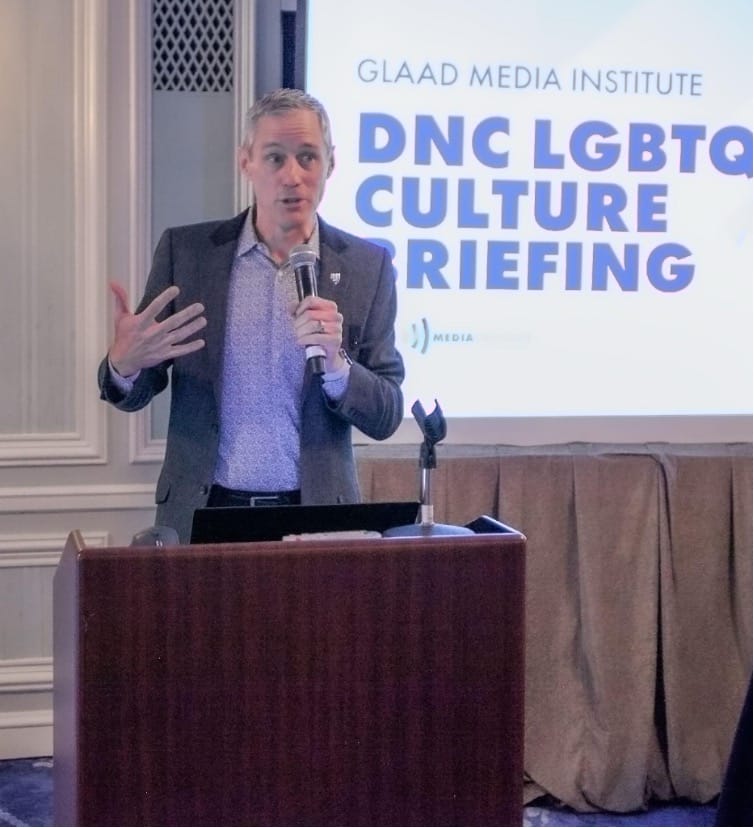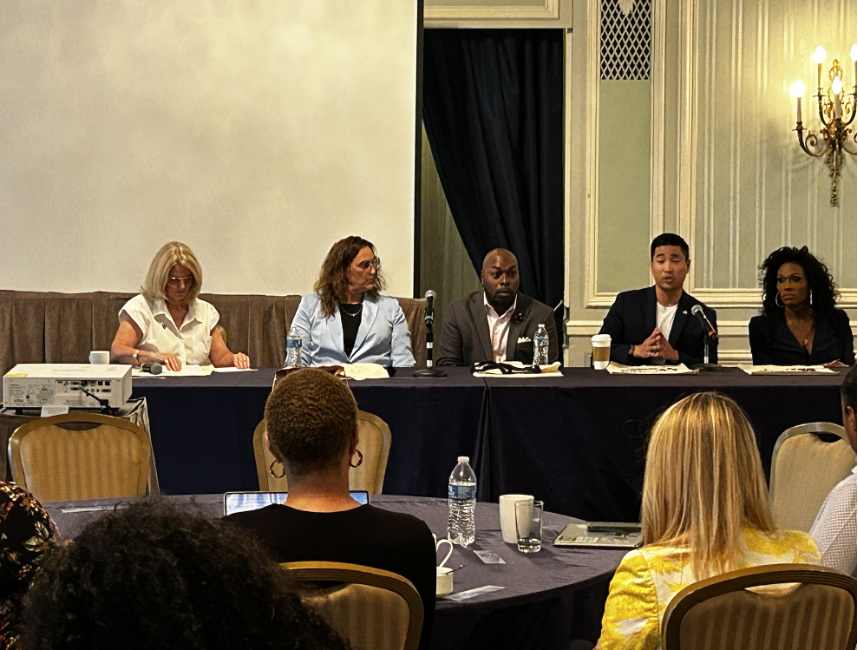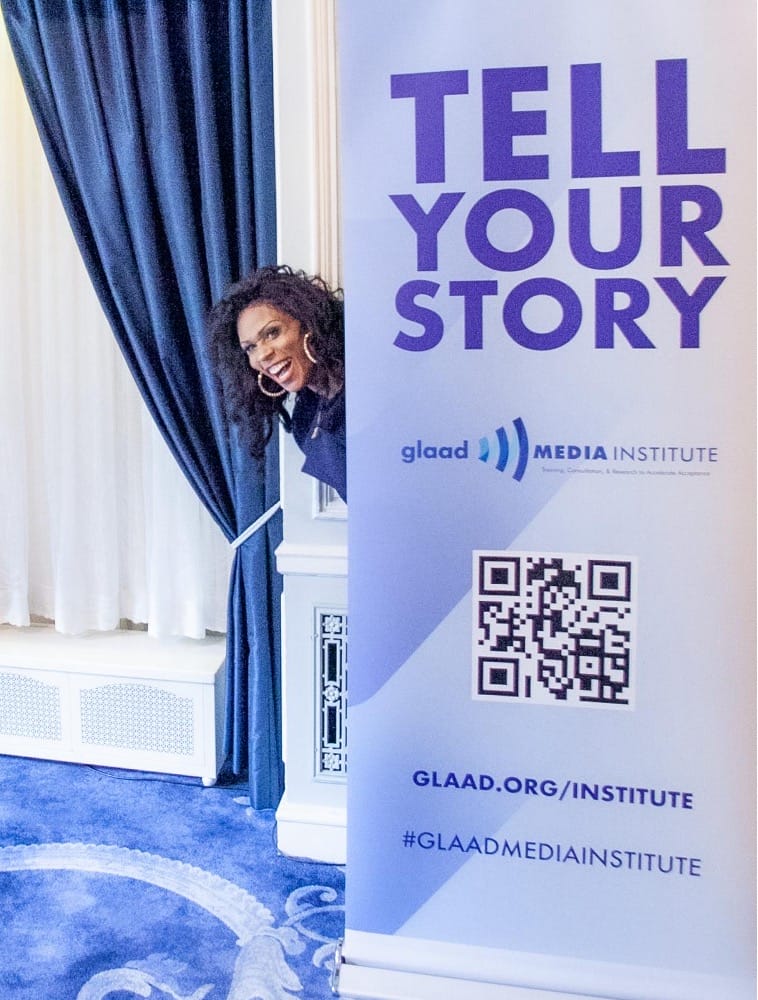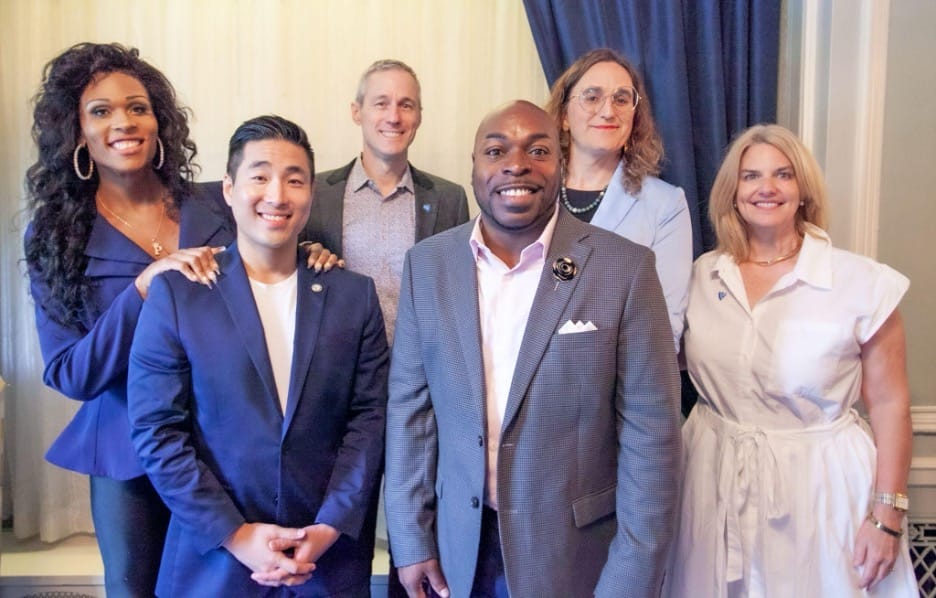On August 20, inside the French Room at Chicago’s Drake Hotel, Ross Murray, Vice President of GLAAD Media Institute, elevated research from the 2024 Accelerating Acceptance Study, an annual release detailing the state of support for LGBTQ Americans and equality during GLAAD’s briefing to DNC delegates and press at the DNC. The Accelerating Acceptance Study examines community support, the negative impacts of political discourse, and the importance of media exposure in changing hearts and minds.
Leading the start of a two-part briefing, Murray spoke to an audience of LGBTQ leaders, organizers, allies, and media professionals—making his objective for the briefing clear at the onset—” to talk about the real-world impact, so it can empower you to help us continue to fight the misinformation that happens in the media and has already been happening through this election cycle, and will undoubtedly continue throughout this election cycle,” Murray told the audience.
Released on August 15, this report marks the ninth year GLAAD has released these findings. While 91% of Americans believe LGBTQ people deserve to live their lives free from fear, 70% of Gen Z, the most out generation ever, reports experiencing discrimination based on sexual orientation or gender identity.
“The political environment we live in today is greatly impacting the LGBTQ community in a negative way, especially Gen Z LGBTQ adults,” Murray said. “We’re seeing real-world impact from the legislation and the media narrative coming around that legislation.”
Additionally, more than 70% of Americans say they don’t know someone who is transgender, which GLAAD is working to change with the release of the Here We Are campaign, a video series that combats unchecked misinformation about transgender people and supercharges transgender visibility through profiles of transgender people and their supportive families.

However, at the Culture Briefing, the audience was able to witness the real-world impact of existing as a queer person in the current political climate where there are no federal protections for LGBTQ people, instead a patchwork of rights that vary from state to state and can change based upon the political makeup of the Supreme Court and the party in power.
Visibility is the best advocacy for the future
State Rep. Leigh Finke (DFL-MN), the first out transgender member of the Minnesota Legislature, was one of two transgender people, along with actress and RuPaul’s Drag Race alum Peppermint, also a GLAAD board member, to illuminate the numbers from the Accelerating Acceptance report with their lived experiences on the four-person panel. Panelists also included out State Rep. Sam Park (D-GA), Darian Aaron, GLAAD’s Director of Local News: U.S. South, and GLAAD President and CEO Sarah Kate Ellis moderated.
Finke says she received support from Minnesota Governor and Vice Presidential nominee Tim Walz for two pieces of pro-trans legislation she authored in Minnesota—the Take Pride Act, which, according to Finke, was an update to the MN Human Rights Act that modernized the definition of sexual orientation and updated the coverage for gender identity. As a result, Finke says she once again found herself on the receiving end of anti-trans conservative attacks.
“What happens, especially when you actually succeed, is that you have an even more vitriolic backlash against the people who are moving to protect trans people, especially trans youth,” Finke said. “There is an obsession with who we are, with what we’re doing, with our bodies, and our words. I would say it’s a sickness.”

Like Finke’s historic election to the Minnesota Legislature, Rep. Sam Park became the first out gay man elected to the Georgia legislature, following 16 others before him who tried unsuccessfully to win election. The most recent legislative session tried and failed to pass over 20 anti-trans bills, many of which focused on expanding a ban on necessary trans medical care to include puberty blockers. The care has been safely prescribed for decades including to non-trans patients, and is supported by every major medical association.
“We were, thankfully, successful,” Park said. “As the Whip of the Democratic caucus, I had to negotiate with the Speaker on two bills that made it to the finish line. But, [we] thankfully stopped every single anti-LGBTQ bill in GA this year,” Park said.
“It is their [anti-LGBTQ legislators] own self-fulfilling prophecy. It is their own doom,” Finke said. “The more that they do this, the more they are losing. And the more we are able to tell our story with sympathy and with care because we are just people, and when you meet people, you realize that they are not monsters.”
In his role at GLAAD, Aaron has been working through GLAAD’s Atlanta bureau to change the narrative in mainstream local coverage about LGBTQ people, particularly in the South. Ellis asked Aaron to speak on the progress he’s seeing across the region.
“Before GLAAD made a commitment to increasing LGBTQ coverage in the South, the coverage was minimal. I think a better word would be abysmal. The coverage was abysmal in the South,” Aaron said. “Since we have made a commitment to increasing that coverage, we’ve seen a complete turnaround in the South. We are telling real stories, fair and accurate stories about LGBTQ people and people living with HIV in the South.”
Peppermint, who is on the cusp of making television history in the upcoming second season of the Netflix comedy-drama “Survival of the Thickest,” spoke to the early obstacles she faced as a Black trans woman in the entertainment industry.

“I knew that it was an uphill battle from the start,” Peppermint said. “But I also come from a time in the 90s when drag entertainers and queer entertainers; we couldn’t rely on mainstream pretty much anything to help us through. So we knew that if [projects] were gonna come out, it was gonna come from the community, from the energy, from us galvanizing,” before she added—”I was up for the challenge.”
Finke reminded the room that the presence of LGBTQ people, specifically trans people, is the best advocacy for the future of our community.
“We are just trying to live our best life,” Finke said. “We deserve to be able to exist in our communities, and by existing in our communities, we are advocating for our own rights to exist into the future.”













